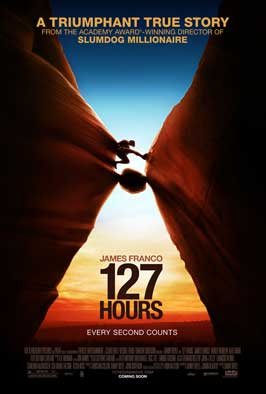
127 HOURS
UK, 2010, 95 minutes, Colour.
James Franco, Kate Burton, Treat Williams.
Directed by Danny Boyle.
127 hours means time going into a sixth day. That was the amount of time that climber, Aron Ralston, was in a crevasse, trapped when he fell and a large stone pinioned his arm.
One of the main features of this true life film (the author wrote of his ordeal in a book titled Between a Rock and a Hard Place) is that it shows the irrevocability of an accident. No amount of anger, not the least bit of wishful thinking can change what has happened. It’s the precariousness of the accident that comes across as well. Aron Ralston was climbing alone in the mountains, with a limited amount of food and, more importantly, water.
While there are many lyrical moments in the film, this is a story that is visceral and does not hesitate to indicate the reality of the physical pain, especially when Aron decides that amputation of his trapped arm is the only solution for his survival. Not that the film offers too many graphic close-ups, just enough for us to see and for the camera movement and the editing to make the suggestions more powerful.
James Franco plays Aron Ralston and brings him alive as an eager young man who loves the mountains, has a zest for living and finds that his life might be suddenly coming to an end. We are introduced to him cycling hard, climbing vigorously and helping two hiking girls to enjoy the spirit of the climb (and an exuberant freefall into a cavernous pool). These memories will come back to him – and he can also watch them as he has his video camera with him and leaves it on over the days of his suffering. He remembers his family, past episodes (some with joy, some with regret). He is also encouraged to persevere, especially during the amputation , by his vision of a young boy smiling at him.
The director is Danny Boyle, filming after his Oscar-winning Slumdog Millionaire. (Boyle has shown great versatility and a wide range of interests: Trainspotting, The Beach, 28 Days Later, Millions, Sunshine). He has worked with The Full Monty’s screenwriter, Simon Beaufoy. The atmospheric (sometimes pounding) score was composed by Slumdog Oscar-winner, Indian A.H. Rahman.
Boyle has always shown great flair in his visual style, much more evident here with time-lapse photography, split screen shots, and a heightened colour palette for mountains and desert.
As with so many stories of real people, the actual Aron, with his wife and baby son (the premonition fulfilled), appears smilingly at the end – and still climbs though, as the caption reads, he always leaves a note to say where he will be.
1. The acclaim for the film, the nominations and awards?
2. The film as autobiography, the end credits and the central character’s photo?
3. The title, the extent of the ordeal?
4. A visual film, Aron and his ability at sport, his skills, energy, climbing, his being trapped, the arm being fixed, feeling thirst and hunger, his decision, the cutting of his arm? The audience sharing the experience?
5. The visuals: the colour grading, for the desert, the mountains, time-lapse motion, split screen? The flashbacks, the video camera and the shots? The suggestions for the amputation? The editing?
6. Aron in himself, his age, experience, family background, the flashbacks of his parents, his relationship with his girlfriend, tensions? The mountains, climbing, cycling in the desert, the climbing skills, the accident, his treatment of his situation? His personality?
7. The structure of the film: the introduction, meeting the girls, climbing, the jump into the pool, the swimming? His climbing and the accident? The insertion of the flashbacks, their cumulative effect? The filmed sequences and his watching them on his camera? Dreams, the hallucination, the young boy urging him forward? The linear underpinning of the story?
8. The girls, meeting Aron, the trek, sharing with him, amiable, the jump into the pool, the swimming?
9. Aron and his being alone, the fall, the experience, his determination, decisions, being alone, crying out, the possibilities for help or not?
10. His arm, testing the cutting, his finally doing it, the blood, wrapping his arm, coping? His descent, being found by the family, hospital?
11. The value of this kind of story, a rugged individual, not giving up, the experience of pain, the will to live, goals for living?